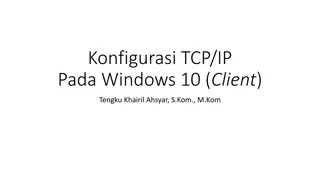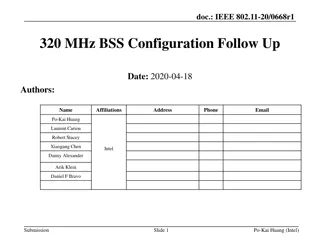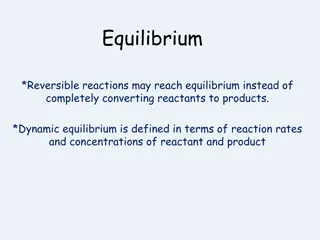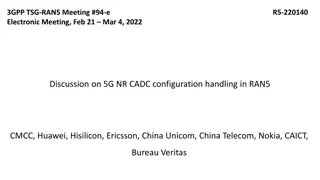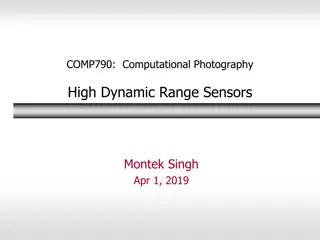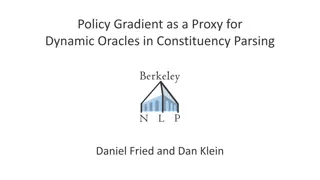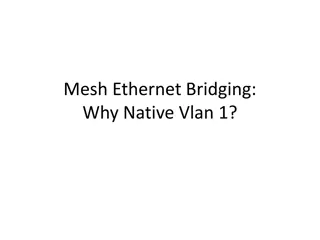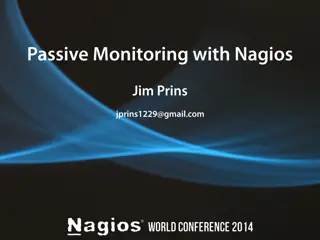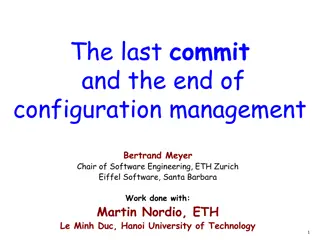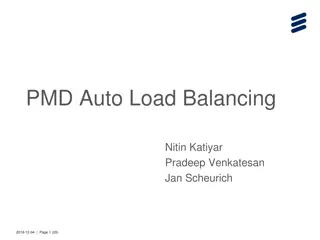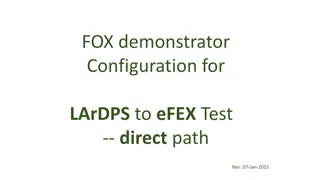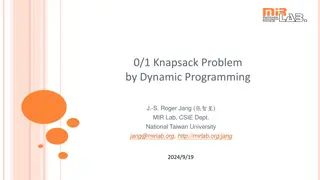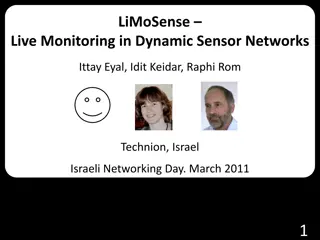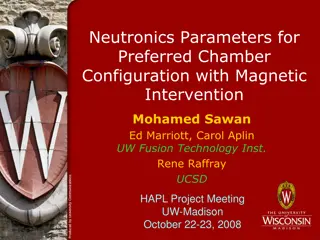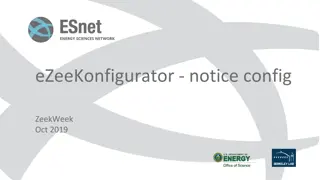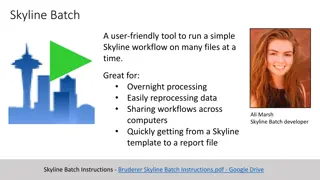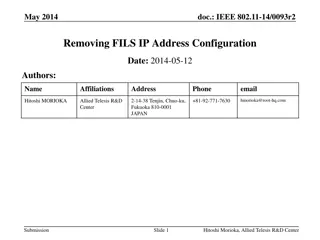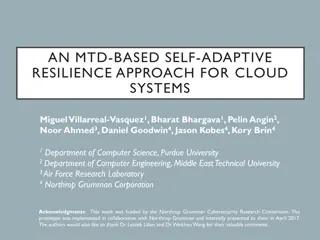Step-by-Step TCP/IP Configuration on Windows 10 Client
Detailed guide on configuring TCP/IP settings on a Windows 10 client, including preparation steps, configuration steps, and verification of settings. The guide provides clear instructions with accompanying images for each step.
1 views • 12 slides
WHONET Training Course: Laboratory Configuration and Setup
Understanding the laboratory configuration process in WHONET is crucial for effective data entry and analysis. This module guides users on setting up a new laboratory, entering country and lab details, defining antibiotics, sample locations, and data fields, creating microbiological alerts, and savi
3 views • 57 slides
Proposal for Location Configuration Information (LCI) in IEEE 802.11 Beacons and Probe Responses
This document proposes the inclusion of Location Configuration Information (LCI) data in a standard information element broadcast in Beacons and Probe Responses within IEEE 802.11 networks. By enhancing the accessibility of infrastructure location to non-AP STAs, this proposal aims to simplify locat
1 views • 5 slides
Dynamic Pricing Strategies for Cargo Services by Revenue Technology Services
In today's fast-paced and competitive logistics industry, dynamic pricing has emerged as a pivotal strategy for maximizing revenue and improving efficiency. Revenue Technology Services (RTS), a leading provider of advanced cargo solutions, leverages dynamic pricing to optimize cargo service offering
1 views • 6 slides
Being a Dynamic Social Citizen: Start with Hello Week 2019-2020
Why is being a dynamic citizen important? Learn how connectedness can positively impact behavior and success in school. Explore key definitions like "Connectedness," "Dynamic," "Social Citizen," and "Inclusive," and discover a three-step guide on becoming a dynamic citizen by recognizing when peers
1 views • 17 slides
IEEE 802.11-20/0668r1: EHT BSS Configuration Proposal
The document discusses the configuration of a 320 MHz BSS in the context of 6 GHz regulations, focusing on EHT operation elements such as channel width indication, CCFS principles, and BSS advertisement settings. It proposes design principles for managing legacy and EHT STA operations, emphasizing s
0 views • 14 slides
Dynamic Memory Allocation in Computer Systems: An Overview
Dynamic memory allocation in computer systems involves the acquisition of virtual memory at runtime for data structures whose size is only known at runtime. This process is managed by dynamic memory allocators, such as malloc, to handle memory invisible to user code, application kernels, and virtual
0 views • 70 slides
Understanding Dynamic Equilibrium in Chemical Reactions
Explanation of reversible reactions, dynamic equilibrium, and the characteristics of equilibrium in chemical systems. Covers the concept of reversible reactions, dynamic equilibrium, rules for dynamic equilibrium, and examples to illustrate these concepts visually.
0 views • 54 slides
Enhancing EPS Authorization and Configuration Options in 5G Networks
The proposal focuses on enhancing authorization and configuration options in EPS using protocol configuration options. It discusses the attach procedure, ePCO checking, and the importance of ePCO support in the network architecture. The solution presented emphasizes the role of MME, SGW, and PGW-C+S
0 views • 8 slides
Discussion on 5G NR CADC Configuration Handling in RAN5
The discussion revolves around the existing Tdocs and WIs focusing on how to handle 5G NR CADC configuration within RAN5. It includes proposals to streamline guidelines and checklists to effectively manage new configurations. Various operators and entities like CMCC, Huawei, Ericsson, China Unicom,
0 views • 9 slides
Understanding Bipolar Transistor Configurations for Electronic Circuits
Explore the three common configurations - Common Base, Common Emitter, and Common Collector - for Bipolar Transistors in electronic circuits. Each configuration offers unique characteristics such as voltage gain, current gain, and impedance levels, impacting the signal processing and amplification c
0 views • 27 slides
Discussion on Multi-PUSCH Configuration for UTO-UCI Content Moderator at Ericsson
This discussion encompasses the configuration and implications of the Multi-PUSCH setup based on agreed parameters within the UTO-UCI content moderation context at Ericsson. It delves into varying configurations, potential impacts, and considerations for effective utilization. The slides provide ins
0 views • 17 slides
Eugene A. Nida - Pioneer of Dynamic Equivalence Bible Translation Theory
Eugene A. Nida (1914-2011) was a linguist who revolutionized Bible translation theory with his concept of dynamic equivalence. Through works like "Toward a Science of Translating," he shaped modern translation studies. Nida's theory distinguishes between formal and dynamic equivalence, favoring the
0 views • 10 slides
Understanding High Dynamic Range Sensors in Computational Photography
Dive into the world of High Dynamic Range (HDR) sensors in computational photography with topics covering sensor architectures, CMOS sensing techniques, dynamic range evaluation, and basic concepts related to image sensors and pixel integrators. Explore the importance of dynamic range in capturing a
6 views • 33 slides
5G Use Case Proposal for Dublin Ericsson
This proposal outlines the use of NETCONF for configuration management in 5G networks, focusing on Dublin. It covers topics like Configuration with NETCONF, NETCONF Overview, NETCONF Security, YANG Overview, and Proposed Use Cases and Requirements for Dublin. The proposal emphasizes the importance o
7 views • 20 slides
Econometric Theory for Games: Complete Information, Equilibria, and Set Inference
This tutorial series discusses econometric theory for games, covering estimation in static games, Markovian dynamic games, complete information games, auction games, algorithmic game theory, and mechanism design. It explores topics like multiplicity of equilibria, set inference, and mechanism design
1 views • 23 slides
Dynamic Oracle Training in Constituency Parsing
Policy gradient serves as a proxy for dynamic oracles in constituency parsing, helping to improve parsing accuracy by supervising each state with an expert policy. When dynamic oracles are not available, reinforcement learning can be used as an alternative to achieve better results in various natura
0 views • 20 slides
Exploring the Impact of Wing Configuration on Paper Airplane Flight
Explore how changing the wing configuration of paper airplanes affects their flight distance. Learn about lift, drag, and aerodynamics, and conduct experiments to test hypotheses. The results provide insights into the role of wing design in flight performance.
0 views • 12 slides
Focal Point Responsibilities in Data Management System
Detailed instructions on key responsibilities of a focal point including user creation, configuration backups, data export, maintenance, and configuration import in a data management system. Tasks involve creating and editing users, exporting configurations and data, and maintaining system integrity
0 views • 12 slides
Techno-Economic Analysis of Calcium Looping Processes for Low CO2 Emission Cement Plants
This study explores the application of Calcium Looping (CaL) processes in cement plants to reduce CO2 emissions. The process involves using CaO as a sorbent to capture CO2 from flue gas, with the potential for integration at different points in the cement production process. The Tail-end CaL configu
3 views • 14 slides
Understanding Native VLAN 1 in Mesh Ethernet Bridging
Mesh Ethernet bridging utilizes native VLAN 1 for the initial configuration, ensuring the RAP connects to the native VLAN ID 1 on a switch. This setup affects the communication between the RAP and the Map devices, as well as their connection to the controller. Misconfigurations related to VLAN taggi
0 views • 9 slides
Managing Passive Host and Service Checks with Nagios Core
Learn how to enable passive host and service checks in Nagios Core via the configuration file, allowing for monitoring without actively polling the hosts and services. Understand the setup, configuration, and usage of passive checks in your monitoring system. Explore examples and best practices for
0 views • 30 slides
Understanding BIND DNS Security Vulnerabilities and Configuration
Dive into the world of BIND DNS with a focus on security vulnerabilities, zone transfer restrictions, rate limiting, and essential configuration options. Explore key topics such as ISC mailing lists, CVE announcements, and best practices for setting up BIND DNS servers.
1 views • 16 slides
Evolution of Configuration Management in Software Engineering
Explore the evolution of configuration management in software engineering, highlighting key practices like cloud-based IDE, shared repositories, and unobtrusive configuration management. Understand the importance of modern best practices in software development, traditional vs. optimistic approaches
0 views • 20 slides
Dynamic Memory Management Overview
Understanding dynamic memory management is crucial in programming to efficiently allocate and deallocate memory during runtime. The memory is divided into the stack and the heap, each serving specific purposes in storing local and dynamic data. Dynamic memory allocators organize the heap for efficie
0 views • 31 slides
Automatic Load Balancing Proposal for PMD Port Queue Assignment
This proposal discusses dynamic port queue assignment strategies for PMDs in network environments. It covers both static and dynamic assignment methods, such as round-robin and cycles-based algorithms, to ensure uniform load distribution. The proposal introduces an automatic load balancing feature,
0 views • 20 slides
LArDPS to eFEX Test Configuration for FOX Demonstrator
Configuration details and diagrams for testing the direct path from the LArDPS to eFEX in the FOX Demonstrator, including optical insertion loss measurements, offset calibration using different setups, and diagrams without splitters. The setup matches the planned configuration for the test.
0 views • 34 slides
0/1 Knapsack Problem by Dynamic Programming: Optimal Solutions for Maximizing Value
Solving the 0/1 Knapsack Problem involves finding the most optimal combination of items to maximize value while staying within a given weight limit. Dynamic Programming (DP) offers a three-step approach to address this optimization challenge efficiently. By calculating the Optimum function and follo
0 views • 5 slides
Updates on iKAGRA Installation and Configuration Changes
The report discusses changes in the iKAGRA configuration from Fabry-Perot Michelson Interferometer to Michelson Interferometer due to schedule constraints and budget limitations. The document outlines the revised schedule for installation tasks, shift applications, and the impact on the KAGRA projec
0 views • 16 slides
Challenges and Innovations in CXL 3.0 Dynamic Capacity Devices
Exploring the intricacies of CXL 3.0 Dynamic Capacity Devices presented at the LPC CXL micro conference 2023, focusing on asynchronous memory operations, partial extents, interleaving flow challenges, and memory sharing. The discussion delves into the dynamic capacity feature allowing memory changes
0 views • 17 slides
Discover the Benefits of Dynamic Yoga Practice
Dynamic Yoga is an ancient practice focusing on fluid and lively movements, offering immense health benefits such as toning internal organs, strengthening connective tissue, correcting spine alignment, enhancing breathing technique, and promoting mental clarity. Explore dynamic yoga poses like Chair
0 views • 5 slides
Insights into Operating Experience and Configuration Management in Nuclear Power Plants
Explore the significance of Operating Experience (OE) in refining machine and human performance, reinforcing desired behaviors, solving problems timely, and sharing industry-wide knowledge in nuclear power. Learn from examples highlighting the importance of configuration management in mature nuclear
0 views • 11 slides
Real-time Monitoring in Dynamic Sensor Networks: LiMoSense Study
This study delves into LiMoSense, a live monitoring approach for dynamic sensor networks, exploring challenges such as correctness, convergence, and dynamic behavior. The research focuses on sensors' communication, aggregation of read values, and the use of bidirectional and unidirectional communica
0 views • 45 slides
Advanced Neutronics Parameters for Fusion Chamber Configuration with Magnetic Intervention
Detailed analysis and design considerations for a fusion chamber configuration utilizing magnetic intervention to optimize neutronics parameters. The discussion includes blanket configuration, neutron wall loading distribution, blanket design options, nuclear design requirements, and dimensions meet
0 views • 12 slides
Recap of eZeeKonfigurator Notice Configuration and Zeek Week Oct 2019
A summary of events involving a talk at Zeek Week, issues with notice configuration, experiences with Zeek/Bro, and the introduction of eZeeKonfigurator for configuring Zeek clusters. The content includes descriptions of individuals involved, challenges faced, support for cluster configurations, and
0 views • 20 slides
Efficient Skyline Batch Workflow Tool for Processing Multiple Files
Utilize Skyline Batch, a user-friendly tool developed by Ali Marsh, to run simple Skyline workflows on multiple files efficiently. This tool is ideal for overnight processing, reprocessing data easily, and sharing workflows across different computers. Quickly transform Skyline templates into report
0 views • 4 slides
Removal of FILS IP Address Configuration in IEEE 802.11-14/0093r2
This document details the rationale behind the proposal to remove FILS IP Address Configuration in IEEE 802.11-14/0093r2. The author, Hitoshi Morioka, explains that the need for this configuration is redundant due to the HLP encapsulation's ability to support all required functions. By eliminating c
0 views • 18 slides
CLR-DRAM: Dynamic Capacity-Latency Trade-off Architecture
CLR-DRAM introduces a low-cost DRAM architecture that enables dynamic configuration for high capacity or low latency at the granularity of a row. By allowing a single DRAM row to switch between max-capacity and high-performance modes, it reduces key timing parameters, improves system performance, an
0 views • 42 slides
MTD-Based Self-Adaptive Resilience in Cloud Systems
Cloud systems face increasing attack surfaces, requiring resilient and self-healing mechanisms. This study explores a Moving Target Defense (MTD) approach for cloud systems, aiming to construct an attack-resilient framework through dynamic network configuration and continuous replacement of virtual
0 views • 36 slides
Understanding Dynamic Loading and Linking in Memory Management
This presentation covers the concepts of dynamic loading and linking in memory management, discussing how programs and data are managed in physical memory, the advantages of dynamic loading, and the process of dynamic linking for system language libraries. The use of stubs for locating memory-reside
0 views • 12 slides
